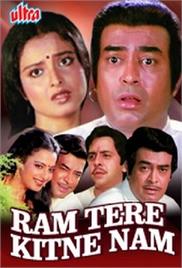Be Careful of Fake Websites. Always use HindiMovies.to domain & Join our Telegram Channel for Latest Updates.

Likes: 1
Views: 1.45K
Peturam is an overweight, albeit sensitive young man, who is head over heels in love with beautiful Radha, the sister of Tej Singh, and would like to marry her. When he proposes to marry her, Tej makes fun of him, asks him to gather together at least 10 lakh rupees before he can even be considered as a prospective groom. Crestfallen, Peturam re-locates to Bombay city, where he starts to work driving a taxi, and buying lottery tickets, all quite in vain, as he finds himself quite far away from his target of 10 lakh rupees. Then one day he meets with a Bollywood film-maker, who decides to give him a chance in movies. The movie turns out to be a success, making Peturam, who is now known as Ram Kumar, a millionaire overnight. Pleased with his success and ensuring that he has more than enough to satisfy Tej Singh, Ram triumphantly returns to his home-town in his chauffeur-driven Mercedes Benz – only to find out that Radha has already been married to a man named Aloknath Gupta, and is soon to bear his child. Watch how a devastated Ram Kumar attempts to put the remainder of his life together – in a career that he never wanted in the first place.
Released: 1985
IMDb Rating: 5.7/10 (28 Votes)
Genre: Drama, Family, Hindi Movies
Stars: Prem Chopra, Sanjeev Kumar, Lalita Pawar, Rekha
Directors: P Madhavan
Writers: B. Bala Murugan, Jainendra Jain
Year: 1985
Server 1 – Youtube
Server 2 – Youtube
Server 3 – Youtube
Ram Tere Kitne Nam is a poignant 1985 Bollywood drama that explores the complexities of human relationships and societal expectations. Directed by the acclaimed director Harmesh Malhotra, this film is a classic example of Hindi cinema from the mid-80s, reflecting the cultural nuances and emotional depth of that era.
The movie features the legendary Sanjeev Kumar in the lead role of Ram, a character whose life and multiple phases are deeply examined throughout the story. Alongside him, the charismatic Rekha plays a vital role, bringing grace and intensity to the film. Their on-screen chemistry is one of the highlights of the movie and significantly contributes to its emotional impact.
Written with a keen understanding of family dynamics and social issues by the screenwriters of the time, Ram Tere Kitne Nam delves into the facets of love, identity, and societal obligations. The narrative unfolds with Ram's character going through different phases of his life, marked by struggles and reflections that pose the question the film's title suggests: "Ram, tere kitne naam?" which translates to "Ram, how many names do you have?" This metaphorical questioning is symbolic of the many roles and identities that a person assumes in their lifetime.
Plot Summary:
The film captures the journey of Ram, an everyman whose life is a testament to the multiple roles one plays – that of a son, a husband, a friend, and a responsible citizen. The story intricately weaves through Ram's personal victories and setbacks against the backdrop of Indian society, emphasizing the expectations placed upon individuals and the dilemmas they face in fulfilling their duties versus personal desires.
The dramatic tension is heightened by Rekha's compelling portrayal of Ram's partner. Her character stands as a pillar of strength and emotional anchor, reflecting the nuances of women's roles in families during the 1980s. Their relationship portrays love, sacrifice, misunderstandings, and reconciliation, making it a relatable narrative for audiences.
Direction and Writing:
Harmesh Malhotra’s direction is marked by his sensitive handling of emotional scenes and his ability to capture the essence of middle-class Indian life vividly. The drama is paced thoughtfully, allowing the audience to connect deeply with the characters.
The writing, which reflects the social and cultural discourse of its time, elevates the movie beyond a simple family drama. The dialogues are crafted to resonate with the audience's own experiences, making the film both engaging and thought-provoking. It is evident that the screenplay was designed to shed light on the multiple identities a man juggles, making the narrative universal and timeless.
Cast and Performances:
Both actors bring a sense of realism to their roles, avoiding melodrama and instead opting for subtlety that enriches the viewing experience.
Music and Songs:
For Bollywood films, music is often the soul of the cinematic experience. Ram Tere Kitne Nam upholds this tradition with a melodious soundtrack that complements its emotional themes. The music was composed by a notable music director of the time (information on the exact composer and singers would typically be sourced from detailed credits), featuring songs that are reflective, romantic, and poignant.
The songs in the movie serve to enhance the narrative rather than distract from it. Their lyrics often mirror the internal state of the characters, making the film's mood richer and more immersive. Singers known for their expressive voices would have rendered these songs to include both male and female perspectives, adding layers to the storytelling.
Conclusion:
In summary, Ram Tere Kitne Nam is a memorable film that stands out for its exploration of identity, relationships, and social roles. Thanks to powerful performances by Sanjeev Kumar and Rekha, along with Harmesh Malhotra’s direction and evocative writing, the movie offers viewers a touching journey into the heart of familial and personal dynamics prevalent in 1980s India.
For fans of classic Bollywood cinema steeped in drama and family values, this film is a must-watch. It not only entertains but also provokes thought about the many names and roles each individual carries within a lifetime.